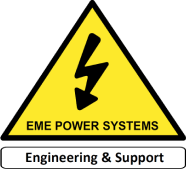PCB Regulations Changing
28th April 2025

What’s changing?
Stemming from a revision to legislation made in 2019, the UK carried out an impact assessment, concluding that any equipment containing volumes of more than 0.05dm3 (0.005%) PCBs is to be classed as contaminated equipment and required to be removed as soon as possible, but by no later than December 31st, 2025.
What are PCBs?
Their full name is Polychlorinated Biphenyls. Although these synthetic organic chemicals have good electrical and fire-resistant properties, they are also known for their toxic and bioaccumulative nature, which poses significant risks to human and animal health. Introduced as insulating oil, PCBs were extensively used in the production of capacitors and transformers from the 1950s, although the manufacture of electrical equipment containing PCBs has been prohibited in the UK since 1987.
What should I look for?
Primarily, any equipment containing insulating oil manufactured before 1976. Typically, transformers, for example, although there is a risk until their prohibition in 1987 of PCBs being present. Caution also needs to be applied even if the oil has been replaced, as there’s still a risk that PCBs are present, along with consideration to cross-contamination where the same equipment has been used to change oil in both contaminated and non-contaminated units.
What do I need to do?
We recommend that the view is taken that PCBs are present in any such unit which could be viewed as falling under any of the above parameters, unless you have information to prove otherwise. Should you not hold this information or wish to ensure compliance with the PCB regulation, EME Power Systems can offer an oil analysis service, typically non-disruptive to supplies, to establish PCB levels within the oil. Following the results, we can advise you further should any remedial action be needed.
If you require any further information or to speak to an Electrical Engineer, please get in touch with us on 01529 410999
News Stories
- High Voltage Equipment & Compliance
- Powering British Farming: EME Power Systems Installs Two New Transformers and High Voltage System to Boost Agricultural Output
- Faulty ACB
- Its Not Just One Man Busy In December!
- Christmas Cheer
- 21st Anniversary!
- WHO YOU GONNA CALL……
- Welcome Mark Baxter
- Overdue Maintenance
- University HV Fault
- Customer Feedback
- Larger Than Your Normal EV’s
- Taking the Biscuit
- Benefits of Furans Testing
- Aftermath of Storm Babet
- Emergency Response to Storm Babet’s Disruption
- Welcoming Samantha Collishaw and Reducing Carbon Footprint
- Ardagh Glass Transformer Replacement
- Considering Voltage Management to Help Cut Bills?
- Graham Haydn-Davies Retirement
- LV Sub-Main Fault
- Cable Joint Failure
- Phil Shaw Retirement
- Directional Drilling
- Pre-Planned Maintenance
- Energy Savings Factsheet
- The Benefits of Carrying Out Planned Preventative Maintenance (PPM)
- EME Transformer Stock Saves the Day!
- PARTIAL DISCHARGE TESTING
- Storm Franklyn
- Helping to Mitigate the UK Energy Crisis
- EME Power Systems Helps Company To Join The Recycling Effort
- Christmas Time Switchgear Changes
- Out of Hours Peace of Mind
- EME Power Systems Fast Response for Major Food Manufacture
- Importance of Regular Intrusive Maintenance
- NHS Challenge
- Automated Packaging at Malvern Worcestershire
- Christmas Arrives Early
- Challenge Accepted
- Through these uncertain times...
- Hayley Paddock Joins EME Power Systems
- Challenging Times
- Low Carbon Electricity
- Our excellent installation teams complete essential works
- Fast Response
- Essential Maintenance
- Solution to a tricky transformer replacement
- It's A Cut!
- EME Power Systems Quarterly Update
- Infrastructure Upgrade
- EME Power Systems Continue As Normal
- It's Cold Inside
- Double transformer failure leads to double success
- Steve Harrison Joins the Company
- Class Cancelled
- Now For Something Slightly Different
- Go Green and Save Pounds
- Cable Fault Repair
- ACB
- Time For A Quick Change Around
- Lincoln Prison
- EME Power Systems Renewables
- An Early Summer Break - Out With The Old, In With The New
- EME Power Systems Midweek Break
